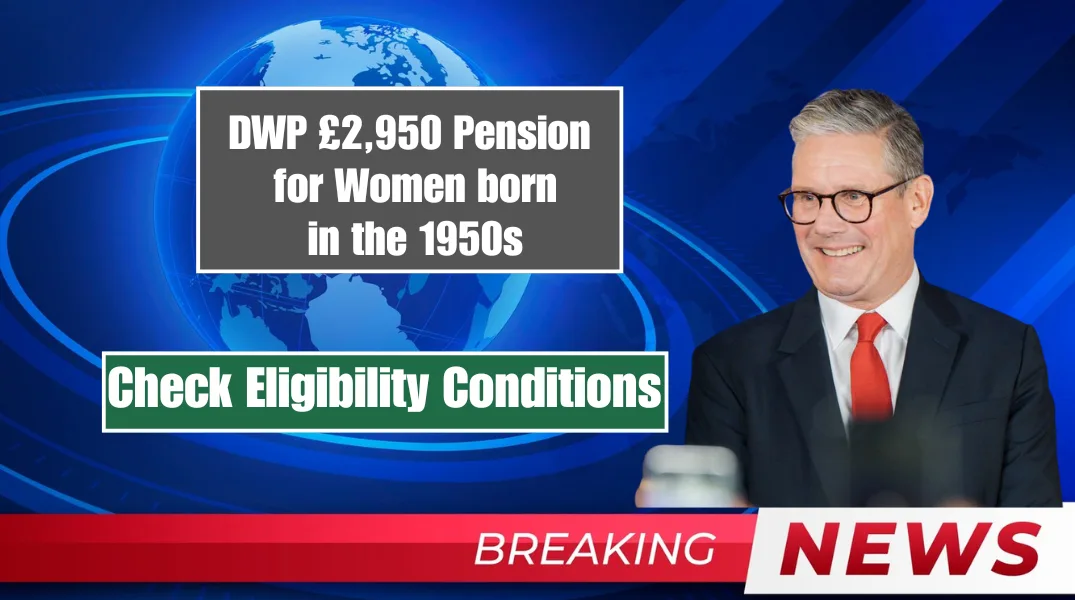DWP £2,950 Pension for Women born in the 1950s: The Women Against State Pension Inequality (WASPI) campaign is once again in the headlines, as the Department for Work and Pensions (DWP) has released a fresh statement just hours before a critical deadline. This comes after WASPI campaigners took a strong legal stand, demanding justice and compensation for women born in the 1950s affected by sudden changes to their state pension age.
Who Are the WASPI Women?
WASPI stands for Women Against State Pension Inequality. These are women born in the 1950s who were hit hard when the government raised the state pension age to equal that of men — from 60 to 65, and later to 66. Many of these women say they were not properly informed about the changes and faced financial hardship as a result.
What Did the DWP Say?
In a recent official statement, the DWP said:
“We do not comment on live litigation. We accept the Ombudsman’s finding of maladministration and have apologised for there being a 28-month delay in writing to 1950s-born women.”
However, the DWP also defended itself by saying that:
- By 2006, 90% of women born in the 1950s knew about the state pension age change.
- Only one in four women remembered reading official letters about the change.
- The Government believes it cannot justify spending £10.5 billion on a compensation scheme, saying it would be unfair to taxpayers.
Why Are WASPI Women Taking Legal Action?
The WASPI campaign argues that the government’s response is unfair and legally wrong.
- The Parliamentary and Health Service Ombudsman (PHSO) had found that women affected should receive compensation — with suggested amounts of up to £2,950 each.
- Despite accepting that there was maladministration in how women were notified, the Government refuses to offer compensation, claiming no real injustice was suffered.
Angela Madden, Chairwoman of WASPI, strongly disagreed with this position, saying:
“The Government has accepted that 1950s-born women are victims of maladministration, but now says none of us suffered any injustice. We believe this is not only an outrage but legally wrong.”
What Happens Next?
To push their case forward, WASPI campaigners have:
- Sent a “letter before action” to the DWP, warning that if the issue isn’t resolved, they will take the case to High Court.
- Launched a £75,000 Crowdjustice campaign to raise funds for the legal battle.
- Given the DWP 14 days to respond, a deadline that passed two weeks ago, putting even more pressure on the government.
Ms. Madden added that the “gaslighting” of WASPI women by the government will not go unchallenged, showing their determination to fight for justice.
Government’s Reason for Refusing Compensation
The main reasons the Government is refusing to pay compensation are:
- They believe most women were aware of the pension changes.
- They argue that such a large payout would unfairly burden taxpayers.
- They claim that although there was a delay in communication, it did not cause serious injustice.
The WASPI fight highlights a larger debate about fairness, government accountability, and justice for women impacted by sudden policy changes. With the DWP standing firm and WASPI women ready to take legal action, the next few weeks could see significant developments in this long-running issue. Whether the High Court will get involved now depends on how the government responds — and WASPI supporters are watching closely.
FAQ
What is the WASPI campaign about?
WASPI (Women Against State Pension Inequality) is a campaign fighting for justice and compensation for women born in the 1950s, who were negatively impacted by sudden changes to the state pension age. They argue that many women were not properly informed of the pension age increase, causing financial and emotional distress.
Why is the UK government refusing to compensate WASPI women?
The government admits there was maladministration in informing women about pension changes but refuses to compensate, claiming that by 2006, 90% of 1950s-born women knew about the state pension age rise. They argue that a £10.5 billion compensation scheme would be too expensive for taxpayers.
How much compensation are WASPI women asking for?
The Parliamentary and Health Service Ombudsman has suggested that each affected woman should receive up to £2,950 in compensation. However, the UK government has rejected this recommendation, leading WASPI to consider legal action.
Is WASPI taking legal action against the UK government?
Yes, WASPI campaigners have sent a ‘letter before action’ to the Department for Work and Pensions (DWP) threatening High Court proceedings if the matter is not resolved. They have launched a £75,000 crowdfunding campaign to support their legal fight.
What is the current status of the WASPI legal fight?
WASPI gave the DWP a 14-day deadline to respond, which passed two weeks ago. They are now preparing to escalate the case to the High Court, as no resolution has been reached. More updates are expected soon as campaigners push forward.
